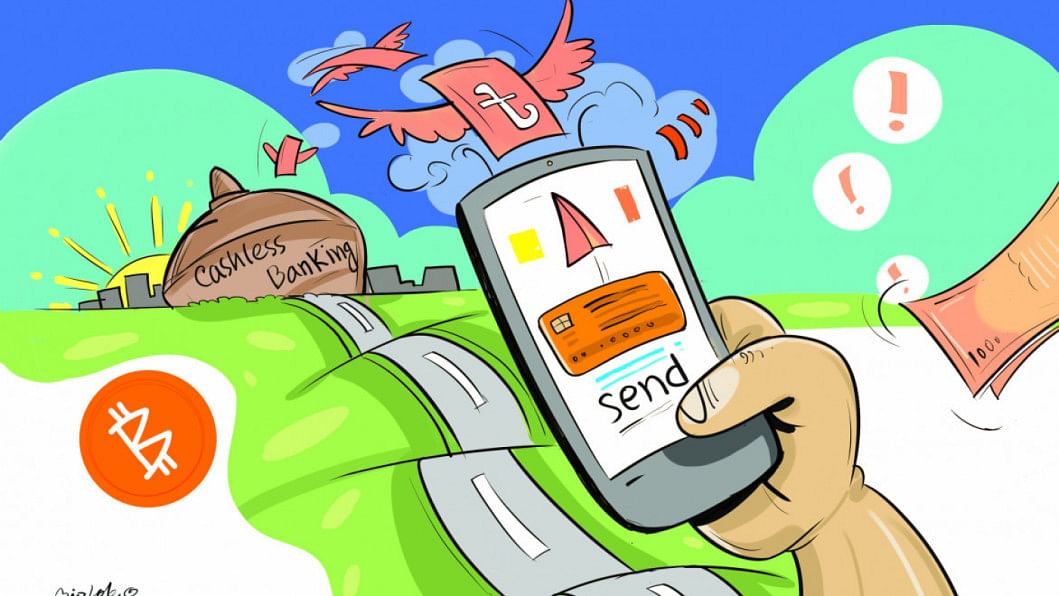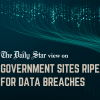With digital banks, we must proceed with caution

Bangladesh has witnessed commendable digital transformation since 2008. As per the current government's 2008 election manifesto, the vision of Digital Bangladesh took centre stage in the grand plan for sustainable development. Rapid digitalisation, embraced by both the public and private sectors, and timely policy support have led to an exponential growth of digital connectivity. The spread of internet connectivity is one of the key indicators of how fast we have adopted digital transformation. From there being just 1.5 million internet users in the country in 2006, this January saw a staggering 66.94 million users.
Due to the push for increasing digital services during the Covid-19 pandemic, e-commerce has thrived. During this development, mobile financial services have also flourished, and even banks are increasingly becoming digital with the help of innovative financial solutions and introduction of digital transaction tools.
As part of this digital journey – now with a focus on Smart Bangladesh Vision 2041 – going cashless has become a key priority for both the public and financial sectors, resulting in some banks and MFS providers going the extra mile to become digital banks. According to media reports, around 52 local and foreign companies have applied to Bangladesh Bank for licences to set up digital banks, including the two top MFS providers, bKash and Nagad, and four state-owned banks – Sonali, Agrani, Janata, and Rupali. The central bank has also approved guidelines for setting up such banks, which will be governed by the Bank Company Act.
While all this is good news, and soon some of the applicants, which include a consortium of 10 local private banks, might even get the required licence, it is time the authorities pause and reflect if the right infrastructure and plans are in place to support and sustain the upcoming digital banks.
While it has become imperative to bring the unbanked population under the formal financial umbrella, this initiative might be counterproductive if the target group is not empowered with adequate literacy on digital security and transactions. The shocking revelation of the MTFE scam, which has snatched away the life savings of its many vulnerable, unsuspecting "clients" should be a key lesson on why digital literacy is essential before they are exposed to new tools.
Let us start with infrastructure. While we have made significant digital strides in the last one-and-a-half decades, we remain vulnerable to threats of cyber attacks. There has been a recent surge in attacks targeting sensitive government and private websites, and data has been exfiltrated and leaked. For instance, in July this year, there was a suspected leak of highly sensitive data of five crore citizens from the Office of the Registrar General, Birth and Death Registration, including birth dates and national identification numbers. On August 15, websites of 25 government and private institutions were hacked. What is of concern is that two of the websites belonged to Investment Corporation of Bangladesh and Directorate General of Health Services, with the former containing data of around 10,000 investors and investment applicants and the latter having information on revenue collection from government hospitals.
And the recent release of the Billion Dollar Heist documentary has once again reminded us of our vulnerability to cyber-financial crimes: we had been subjected to one of the biggest cyber heists in history when criminals stole around $1 billion from the central bank in 2016. While this risk is equally relevant for the existing banking landscape of the country, digital banks might be more susceptible to such attacks, as they would be operating virtually, carrying a hoard of lucrative client data. Therefore, at this point, the authorities must check and recheck if they are capable of providing the required protection.
Besides, we also need to consider the wider spectrum of the digital banking ecosystem, like how to exactly support the unbanked and encourage deposits and borrowings. The fact that unbridled inflation is eating away our savings is no new information for us. Food inflation stands at a 12-year high at 12.54 percent, while general inflation inched closer to 10 percent. Central bank data showed that bank deposits fell to Tk 14,88,447 crore in January 2023 from Tk 14,89,169 crore in December 2022. Given this scenario, how do the potential digital banks propose to encourage deposits, especially from people living in the fringes, earning daily wages?
In terms of lending, if the digital banks are going to focus on providing loans to small and medium enterprises, where would that leave SME-focused conventional banks or the SME disbursement wings of conventional banks? And if the sole focus of digital banks is to provide small loans to the unbanked, how do they propose to ensure collection of the loans provided? The viability of commercial and governance aspects need to be thoroughly scrutinised by the central bank for such banks to sustain themselves in the long run.
While it has become imperative to bring the unbanked population under the formal financial umbrella, this initiative might be counterproductive if the target group is not empowered with adequate literacy on digital security and transactions. The shocking revelation of the MTFE scam, which has snatched away the life savings of its many vulnerable, unsuspecting "clients" should be a key lesson on why digital literacy is essential before they are exposed to new tools.
Digital banks, launched in a conducive environment, can be a great opportunity for the people to utilise this service. A 2018 IMF study suggested that the size of our underground economy is around 30 percent, and Centre for Policy Dialogue said that Bangladesh's tax loss was Tk 84,200 crore in 2021 as a result of the shadow economy. A lot of it is because we have not been able to create a formal payment channel for the underprivileged population, involved in informal jobs. This is where digital banks can come in and create a lasting impact.
However, for digital banks to operate efficiently, they will need effective strategic directions and guidance from the Bangladesh Bank – as governance is already a major pain point for conventional banks and a potential issue for digital banks. Adequate policy support from lawmakers, proper cyber security, and support for digital literacy are also essential.
To turn digital banks into a catalyst for growth, authorities will need to invest efforts, planning and resources to create a conducive ecosystem. Launching digital banks could be a major positive milestone for the nation, but it could also turn into a digital nightmare, depending on the readiness of the ecosystem. We must proceed with caution.
Tasneem Tayeb is a columnist for The Daily Star. Her X handle is @tasneem_tayeb

 For all latest news, follow The Daily Star's Google News channel.
For all latest news, follow The Daily Star's Google News channel. 











Comments